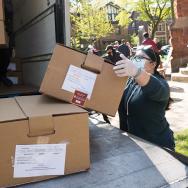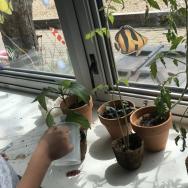The following message was sent June 26 to members of the University of Chicago community from President Robert J. Zimmer and Provost Ka Yee C. Lee:
Recent events, including the killing of George Floyd, have galvanized our campus, our city, and our nation in a movement to address the racism that has long permeated our society. Black people in the United States endured hundreds of years of slavery, followed by over a century of violence and exclusion from much of American life. This history must be confronted as part of the ongoing struggle for equality.
The University has made progress in recent years to address problems of racial bias and inequities on our campus, and to strengthen our relationship with our neighboring communities. However, as University leaders we recognize that there is more work to be done. We believe that doing so requires rigorous study, discussion, and actions. These steps are critical for us to remain committed to the founding principles of the University, and create an inclusive environment where diversity is not only represented but individuals are empowered to fully participate in the exchange of ideas and perspectives that is foundational to the experience of the University.
Addressing racism and creating positive and sustainable change will entail difficult conversations, both within the University and with the broader South Side community. We have a complex history and relationship with our South Side neighbors, with moments of shared accomplishment and moments characterized by discord and mistrust. But it is a history we must understand if we are to fully realize the potential of the University to have a positive impact in the city that is our home. In doing so, it is important that we approach this effort with openness and determination not only as individuals but also as a community so together we can find the best way to move forward.
As a starting point, we will proceed with the following actions:
- Examine the data pertaining to the racial diversity of our faculty, students, and staff and identify ways to increase recruitment, retention, and advancement in areas where people of color are underrepresented.
- Develop new, ongoing programs focused on racism, anti-racism, and numerous forms of bias and exclusion which will be offered to and/or required by all members of the University community.
- Articulate the University’s commitment to diversity and inclusion, which will recognize our history and our present challenges, and will guide our work toward a more just future.
- Expand research capacity to advance understanding and effect changes related to racism and inequality through the establishment of a seed fund.
- Support additions to the curriculum that examine race and anti-racism issues, and enhance resources for inclusive teaching for instructors across the University.
- Build upon our learnings from the Climate Survey, the Diversity Advisory Council report and other inputs to launch a campus-wide effort on the Black student, faculty, and staff experience, considering every aspect of Black life, learning, teaching, scholarship and working on campus.
- Acknowledge and engage with our South Side community to address the University’s history in relationship to our neighbors, examine progress the University has made in partnership with the community, and identify ways in which the University can deepen and strengthen this partnership.
- Enlist our community to understand their experiences with our police department (UCPD) as well as our campus security, considering a range of approaches to ensure the well-being of our campus and the broader community, and continue to strive to make our own practices a model for higher education.
We have faced many obstacles as an institution throughout our history, with the recent COVID-19 pandemic having challenged us in new ways. We recognize that we are calling on our community to act at a challenging time, when tensions are high and the call for change is urgent. We will be working with all units of the University on implementing these actions, and ask that you engage in this process with us as we all move toward building a stronger, more inclusive University.

